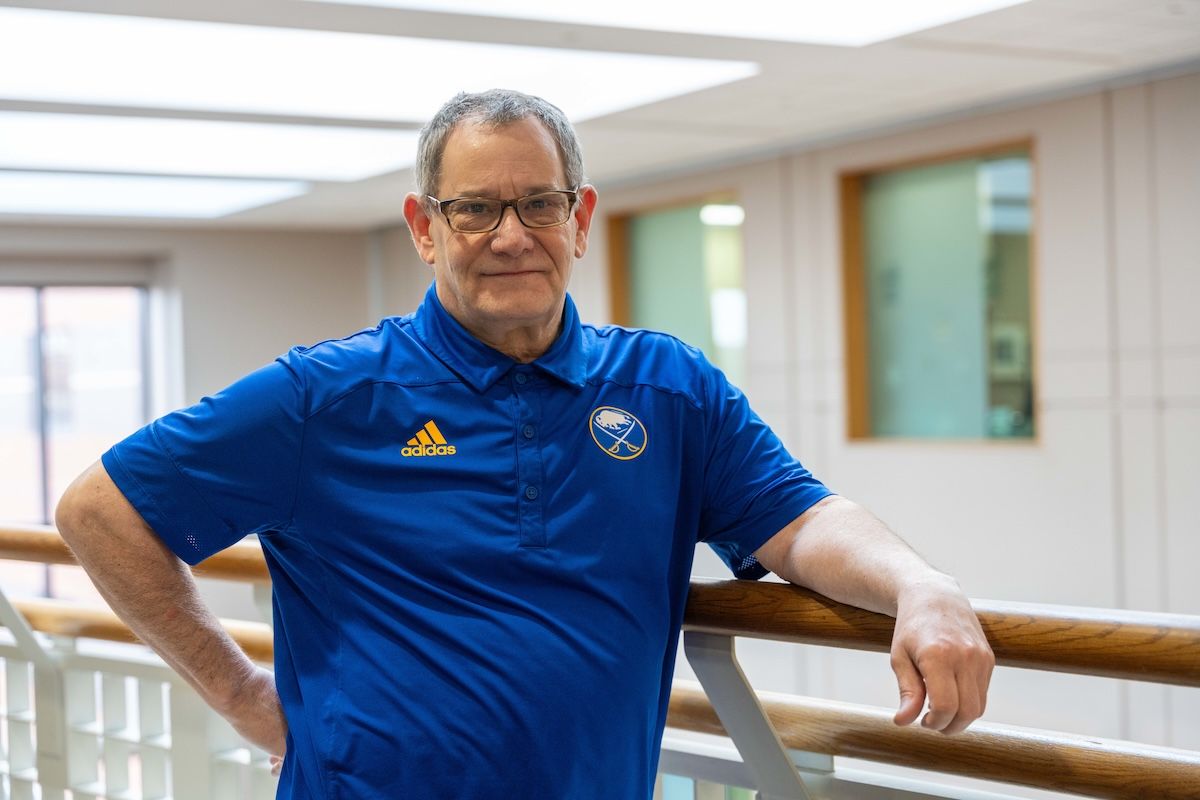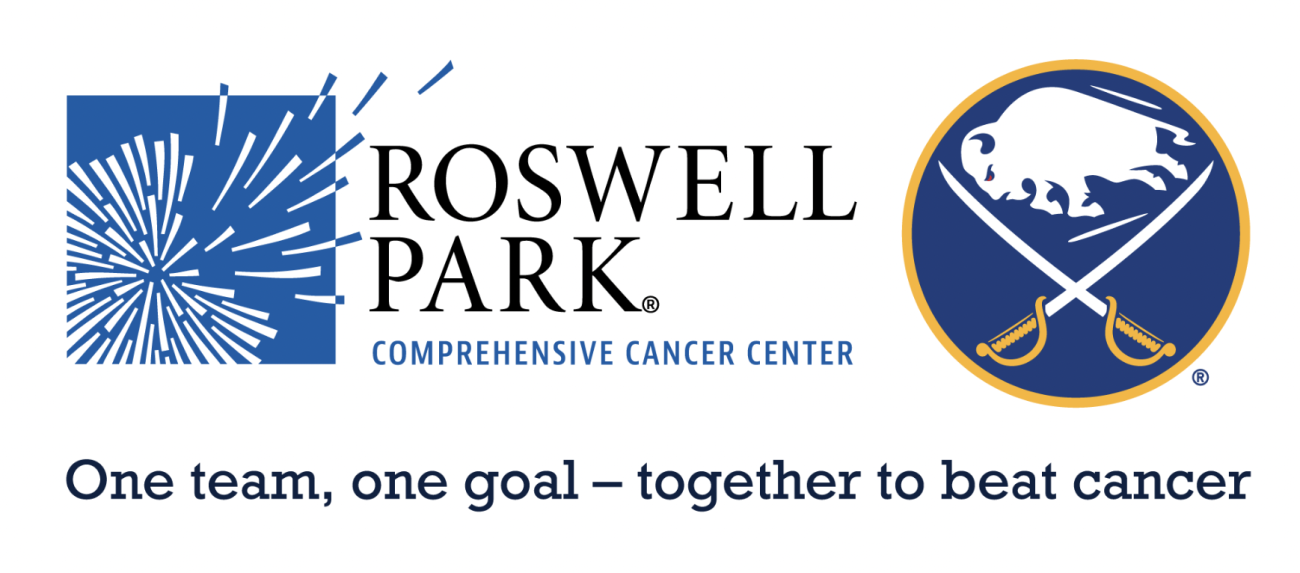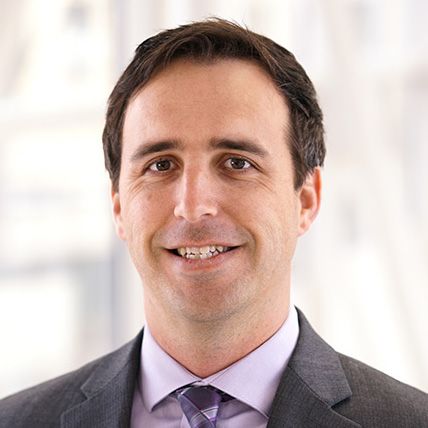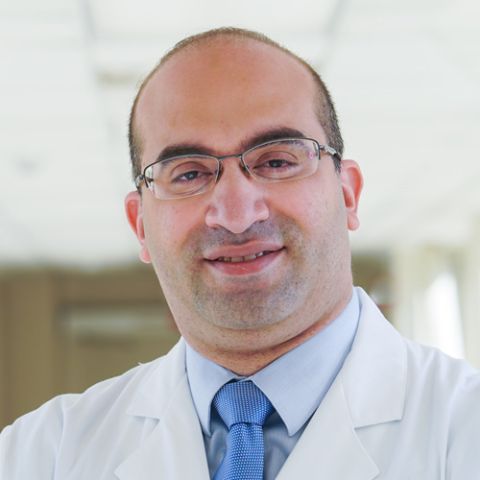Let’s face it: Few men look forward to having a prostate cancer screening and many men totally avoid them. But what if the screening was offered in a less stressful non-medical setting — like a sports arena — and included the chance to meet Buffalo Sabres alumni? And most importantly, what if this event ended up possibly saving your life?
That’s exactly what happened to Russell Wansart, age 66, who attended a prostate cancer early detection event in 2024, sponsored by Roswell Park Comprehensive Cancer Center and hosted by the Buffalo Sabres at KeyBank Center. “If I didn’t love going to Sabres games so much, I might not still be alive today,” says Russell.
Easy parking, meet some Sabres alumni, and more!
Russell and his brother are longtime Sabres fans and season ticket holders. “No matter how the team’s season is going, we love spending time together at the games and soaking in the arena experience,” Russell says. At many of the games, Russell heard announcements about Roswell Park’s upcoming prostate cancer screening event at KeyBank Center.
“They made the screening event convenient by holding it during the afternoon and evening of a non-game day and the parking was free. While I was there, I also met some former Sabres players and checked out a few wellness vendor stands and some educational literature before I had my private screening exam in one of the upper-level suites.”
Buffalo Sabres Prostate Cancer Screening Event
Roswell Park and the Buffalo Sabres are hosting a prostate cancer screening event at KeyBank Center, on Tuesday, November 25 from 3-7 p.m. This event offers complete prostate cancer screening by Roswell Park physicians to all men eligible, between the ages of 45-75!
Screening detects prostate cancer before symptoms appear
Prostate cancer is the most common cancer in men. One in every eight men will receive a prostate cancer diagnosis at some point during their life. The disease can be detected at an early and highly treatable stage through two steps: a blood test to check the level of a protein called prostate specific antigen (PSA) and a digital rectal exam (DRE) to check the prostate gland for any physical abnormalities.
Men should talk to their doctor about having a baseline PSA test to compare with later year’s tests starting at age 45. But prostate cancer is more prevalent in Black men, so they and other men with a family history of prostate cancer or a known genetic mutation should consider PSA testing starting at age 40.
Russell already had prostate cancer screenings with normal results for years during annual physicals with his family doctor. “I didn’t think I had anything to worry about,” Russell recalls. Once in the private setting of a KeyBank Center suite, a Roswell Park nurse asked Russell some questions about his prior screenings, family health history, possible symptoms and other concerns. “I had the blood draw and a Roswell Park urologist performed the exam. The DRE took about 10 seconds and the entire screening took about 10 minutes total.
"I was told that if my test results were normal I’d be notified by mail in a few weeks.”
Treatment by the experts at Roswell Park
A week later, Russell received a phone call from Roswell Park’s Urology Clinic. “I learned that my PSA level was slightly above normal, and they recommended an appointment with urologist Eric Kauffman, MD. Dr. Kauffman explained how PSA levels can increase due to inflammation, infection, use of herbal supplements, vigorous exercise and other factors, so he put me on meds to treat inflammation and I was scheduled for a follow-up appointment three months later,” Russell says. But by his next appointment, Russell’s PSA level had risen even more.
Because Russell’s PSA level was increasing quickly, Dr. Kauffman recommended an MRI, followed by an ultrasound exam and a biopsy. The biopsy results confirmed Russell had a malignant (cancerous) prostate tumor and an unfavorable risk assessment score, meaning he would not be a good candidate for active surveillance.
“Dr. Kauffman recommended treatment with radiation or the more aggressive procedure of robotic surgery to remove the entire prostate gland. He calmly and carefully explained the pros and cons of both options,” Russell recalls. ”After talking it over with my wife and son, I decided on surgery because Dr. Kauffman considered me healthy enough for it, and I felt that surgery would be the best way to be sure all the cancer was removed,” Russell says.
In November, urologist Ahmed Aly Hussein Aly, MD performed robot-assisted surgery to remove Russell’s prostate gland. “I continue to be monitored and treated for some normal healing and functional therapies and tests, but the most important thing is that my PSA levels are going down. Everyone I’ve worked with at Roswell Park has been fantastic. Dr. Aly, Dr. Kauffman and their staff always patiently and thoroughly explain every step of my treatment and patiently answer questions from me and my family."
A Patient’s Guide to Prostate Cancer
This essential guide — written by Roswell Park’s prostate cancer experts — will help walk you through what to expect with your diagnosis, treatment and beyond, so you can make informed decisions about what’s best for you.
Advice for those avoiding their screening
"After my surgery, the recovery nurses and staff were kind, efficient and great at communicating with me and the doctors. And the physical therapy staff has helped me regain strength and cope with the physical and practical issues related to my treatment," Russell says.
Now, nearly six months after attending the early detection event, Russell has some sage advice for men. “Don’t avoid your prostate cancer screenings. Get them at the recommended age to get a baseline reading and then keep up to date with them. Even if you’re hesitant about the screenings, go anyway!”
For many people, getting screened at community outreach events offered by Roswell Park can be more convenient and less intimidating than getting screened in a doctor’s office. You might meet some Sabres alumni. You might even end up saving your life.
Editor’s Note: Cancer patient outcomes and experiences may vary, even for those with the same type of cancer. An individual patient’s story should not be used as a prediction of how another patient will respond to treatment. Roswell Park is transparent about the survival rates of our patients as compared to national standards, and provides this information, when available, within the cancer type sections of this website.






